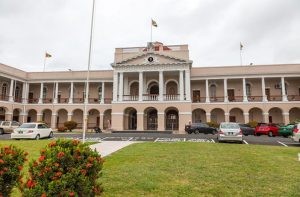West Indies Cricket Fans Forum
We are three months after the long-awaited declaration of the 2020 elections

Kaieteur News – We are three months after the long-awaited declaration of the 2020 elections, and nine after when the results should have been announced were it not for the boldfaced, senile attempt at electoral rigging and despotism by the Granger administration. While that attempt was, in retrospect, relatively bloodless, something we should be grateful for, the fact that it was relatively bloodless should also be of great concern.
The reality is that much of what was attempted, and to a great degree successfully, was done more or less within the ambit of the law. One of Granger’s inane mantras throughout his attempt to remain in power against the express will of the will people was “I have always abided by the Constitution” and while there were several instances – the imposition of his appointment of Justice Winston Patterson as GECOM Chair – which proved that the former President was lying in that regard, the reality is that for the most part, he was correct.
The Constitution of Guyana, as currently constituted, did in fact allow for much of the rabid and indecent attack on the spirit of democracy in this country as we experienced earlier in this year. The current Constitution, except for a few reforms, was put in place in 1980 to legally facilitate the already de facto dictatorship of Granger’s idol and perhaps mentor, Forbes Burnham. While, for example, reform processes saw the constraining of Presidential power via the imposition of term limits – a measure Granger predecessor Bharrat Jagdeo both oversaw while as President, and supported the removal of when he was not – those reforms did little to either constrain the power of the Presidency itself or to place countervailing safeguards within the hands of either the Legislature or the Judiciary.
The thing with Constitutions or similar documents is that they must provide a less than precarious infrastructure to give life to the work programme of those to whom the people have placed their trust. This means that we cannot have arbitrary systems in place to overturn that will and regime change should ideally only take place during elections. The problem is that those systems, which strengthen and safeguard the tenure of executive leadership often do not account for the appearance of a proverbial Mad King, as Guyanese discovered earlier this year and Americans are discovering now.
The Constitution of Guyana is essentially a Mad King manual – its very existence was not only premised on Burnham’s need to extend increasing control over newly independent Guyana, but the method by which it was given ‘democratic’ sanction, a rigged referendum, was evidence in itself of the megalomaniacal.
In the hands of reasonable men, the dictatorial accommodations of the manual are never needed, but the reality is that power makes many reasonable men, and women, unreasonable. It is for this reason that the manual must be destroyed, meaning in this case “rewritten” in order that the temptation towards despotism is removed. David Granger, and the Granger administration, failed – and deliberately so – in rewriting the Constitution of Guyana, despite promises to do so. This was the case with another predecessor of his, Dr. Cheddi Jagan, who was the Burnham’s Constitution’s fiercest opponent until he won the Presidency in 1992. President Irfaan Ali has made no such direct commitment but a moral imperative exists to reform the Constitution in deep and meaningful ways, ways that reduce the power of the presidency and give more responsibility to the people of this country, particularly at the local government level.
When you subscribe to the blog, we will send you an e-mail when there are new updates on the site so you wouldn't miss them.
Guyana Diaspora Forum
We have a large database of Guyanese worldwide. Most of our readers are in the USA, Canada, and the UK. Our Blog and Newsletter would not only carry articles and videos on Guyana, but also other articles on a wide range of subjects that may be of interest to our readers in over 200 countries, many of them non-Guyanese We hope that you like our selections.
It is estimated that over one million Guyanese, when counting their dependents, live outside of Guyana. This exceeds the population of Guyana, which is now about 750,000. Many left early in the 50’s and 60’s while others went with the next wave in the 70’s and 80’s. The latest wave left over the last 20 years. This outflow of Guyanese, therefore, covers some three generations. This outflow still continues today, where over 80 % of U.G. graduates now leave after graduating. We hope this changes, and soon.
Guyanese, like most others, try to keep their culture and pass it on to their children and grandchildren. The problem has been that many Guyanese have not looked back, or if they did it was only fleetingly. This means that the younger generations and those who left at an early age know very little about Guyana since many have not visited the country. Also, if they do get information about Guyana, it is usually negative and thus the cycle of non-interest is cultivated.
This Guyana Diaspora Online Forum , along with its monthly newsletter, aims at bringing Guyanese together to support positive news, increase travel and tourism in Guyana and, in general, foster the birth of a new Guyana, which has already begun notwithstanding the negative news that grabs the headlines. As the editor and manager of the publication, I am committed to delivering Blog entries and Newsletters that are politically balanced, and focused on the positive ideas we wish to share and foster among Guyanese.
| ||||

